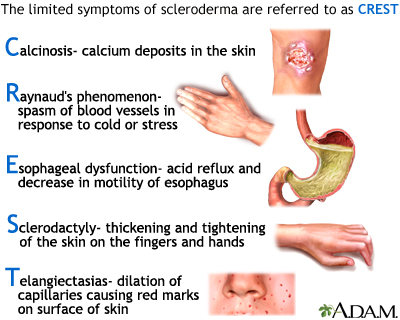Scleroderma

What is Scleroderma?
Scleroderma is a rare, chronic disease of the immune system, blood vessels, and connective tissue characterized by the hardening and tightening of the skin and connective tissues.
Who’s at Risk for Scleroderma?
While anyone can develop scleroderma, it's more common in women than men and typically occurs between 30 and 50 years of age. Some types of scleroderma are more common in certain ethnic groups.
What Causes Scleroderma?
The exact cause of scleroderma is unknown, but it's believed to involve an overproduction and accumulation of collagen in body tissues.
How Does Scleroderma Start?
Scleroderma can start with a few dry patches of skin that slowly spread and become hard and tight.
What Are the Symptoms of Scleroderma?
Symptoms depend on the type and extent of the disease but can include skin hardening, Raynaud's phenomenon, gastroesophageal reflux disease, and problems with internal organs like the heart, lungs, and kidneys.
How is Scleroderma Diagnosed?
Diagnosis is based on a detailed patient history, physical exam, and specialized tests including blood tests
How Can Scleroderma Be Treated?
While there is no cure for scleroderma, various treatments can control symptoms and prevent complications. These include medications to address specific symptoms, physical and occupational therapy, and in severe cases, surgery.
What Complications May Occur with Scleroderma?
Complications vary depending on the parts of the body affected, and may include kidney problems, pulmonary hypertension, heart problems, and difficulties absorbing nutrients due to intestinal damage.
How Can I Prevent Scleroderma?
As the cause of scleroderma is unknown, there are currently no known methods of prevention.
Long-term Management of Scleroderma
Long-term management involves regular medical checkups to monitor the progression of the disease, medications, lifestyle adjustments like a healthy diet and regular exercise, and psychological support to manage the emotional toll of living with a chronic disease.
What is Recent Research Saying About Scleroderma?
Recent research is focusing on understanding more about the genetic and environmental factors that cause scleroderma, as well as developing new treatment options. There is also ongoing research into stem cell transplants as a potential treatment.
Where Can I Go For More Information on Scleroderma?
For more information on scleroderma, visit reputable health websites like the Scleroderma Foundation, the Mayo Clinic, or the American College of Rheumatology.

